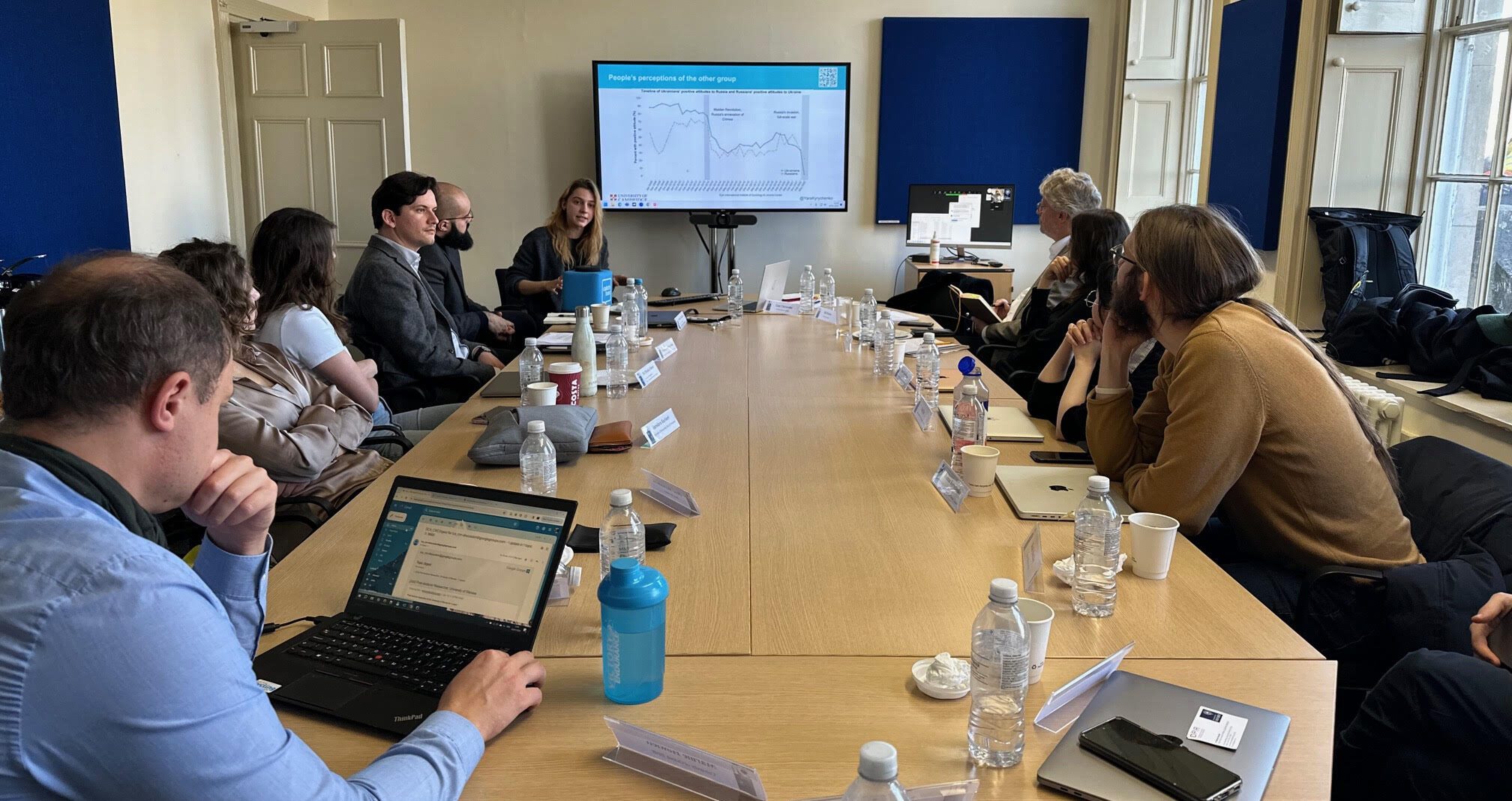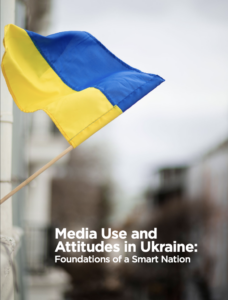The Ukraine Case Studies
Latest: Media Use and Attitudes in Ukraine – Foundations of a Smart Nation
This brief report provides preliminary findings of our project entitled “Access to Information and Media Literacy about Politics: A Collaborative Study”. This project focuses on access to trusted sources of information among the Ukrainian population in the context of the ongoing war in Ukraine following Russia’s full-scale invasion. The study is anchored in a Web-based survey of individuals fielded by Rating Group, based in Kyiv, along with qualitative interviews with individuals who have experience in providing media, online news and information in the Ukraine context. The survey yielded responses from 2,014 individuals, which form the basis of this report, complemented by the information gained from qualitative interviews. A follow-on report will expand on the statistical and qualitative analyses presented here.
About the Ukraine Case Studies
The Ukraine Case Studies are a collection of projects investigating the crisis in Ukraine linked in the Russia invasion in February 2022 that bring together an international group of multidisciplinary researchers and experts. The initiative is focusing on information and communication operations with implications for the present conflict and long-term global practices and policies. The research team is conducting overarching case studies of the developments around influence, networks, and security in the Ukraine crisis as well as a set of embedded case studies of particular developments within Russia, Ukraine and internationally.
These case studies are in early stages of development through working papers, the organization of roundtable discussions, and funding for a survey of the public in Ukraine. The international team is being organised and managed by the Portulans Institute and comprises of researchers from the GCSCC, University of Oxford Saïd Business School, the Oxford Internet Institute (OII), along with Ukrainian social scientists affiliated with the National Academy of Sciences Ukraine, and based in Ukraine, Ireland, and Germany.

These case studies are in early stages of development through working papers, the organisation of roundtable discussions, and funding for a survey of the public in Ukraine. The roundtables were designed to help launch the case research but also to refine our approach, illuminate key research questions, and identify potential ties with researchers in other universities and institutions.
Current Projects
Access to Information Media Literacy about Politics

UNESCO and the government of Japan are supporting study on Access to Information Media Literacy about Politics. The project seeks to enhance understanding of how the Ukraine public access information on politics, the degree of trust they have in various media, and how individuals have adapted their media and literacy habits to the context of the ongoing war.
To meet these aims, a sample survey of 2,000 respondents in Ukraine has been conducted to gain insight on access to information and the media literacy of Ukrainians during the ongoing war following Russia’s invasion of the country. The survey will be complemented by qualitative in-depth interviews about the media landscape in Ukraine during this period. Results of the study will be disseminated widely and a report on the project will be published along with a series of short reports on key findings. The study will support recommendations on practical steps for Ukraine to address evolving issues of media literacy and the ability of its citizens to access reliable information in the context of a war on information as well as the people of Ukraine.
Preliminary Results
Media Use and Attitudes in Ukraine: Foundations of a Smart Nation
This brief focuses on access to trusted sources of information among the Ukrainian population in the context of the ongoing war in Ukraine following the Russian full-scale invasion. The study is anchored in a Web-based survey of individuals fielded by Rating Group, based in Kyiv, along with qualitative interviews with individuals who have experience in the provision of media, online news and information in the Ukraine context. The survey yielded responses from 2,014 individuals, which form the basis of this report, complemented by the information gained from qualitative interviews.
The War on Trust in Public Officials and the Media of Ukraine
This brief paper describes two crucial areas at risk in the Russia-Ukraine War. The first is trust and use of media and information sources. The second is trust and support for public officials and institutions. Attitudes toward media and governmental institutions might suffer in the face of a brutal war. Our survey findings suggest that the war has reconfigured reliance on different media and information sources and increased support for the government and institutions.
Roundtables
To launch the case research three roundtable discussions were scheduled between June 2023 and January 2024. The outcomes of these discussions helped to refine the research approach, illuminate key research questions and identify potential ties with researchers in other universities and institutions.
Roundtable 1: Is the Invasion of Ukraine Reshaping ICT, R&D, and Cognitive Warfare?
This first roundtable, held at HIIG in Berlin in June 2023 served to develop a range of questions to be pursued in the second roundtable. Discussions ranged across key topics, including the implications of the war in Ukraine for the study of media and information networks, and societal implications of AI. Discussion also focused on the governance in the public interest of everything digital, from data, internet platforms, and other information infrastructures.
Roundtable 2: Reshaping Global Information, Communication, and Security: the Russo-Ukraine War
On September 26, 2024 the Portulans Institute held a roundtable at University of Oxford’s Saïd Business School titled “How the War in Ukraine Could Reshape Global Information, Communication, and Security”. The hybrid event was attended by 32 individuals (with 2 apologies from individuals who contributed a position paper), 16 of those participating in-person. The conversation built on over twenty position papers authored by the participants.
Our third and most recent event on January 26, 2024 was an Oxford Forum for early career researchers, held at the Oxford Internet Institute. This third forum focused as well on the implications of the Russia-Ukraine War (RUW) for information, communication, innovation, and cybersecurity. The forum brought together a diverse mix of early career researchers from 12 universities representing 8 countries.

Meet the Team
William H. Dutton, Martin Fellow at the Oxford Martin School, supporting the Global Cybersecurity Capacity Centre (GCSCC), and Senior OII Fellow, University of Oxford, and Director of The Portulans Institute, Washington D.C.
Niva Elkin-Koren, Professor of Law at Tel Aviv University Faculty of Law, former Dean of the Faculty of Law at the University of Haifa, and was founding director of the Center for Cyber, Law and Policy (CCLP), and the Haifa Center for Law & Technology (HCLT)
Sadie Creese, Director of the GCSCC, and Professor of Computer Science in the Department of Computer Science, Oxford University
Soumitra Dutta, Co-Founder and President of Portulans Institute and Peter Moores Dean and Professor of Management in the Saïd Business School at the University of Oxford
Lisa Chernenko is a DPhil candidate at the Oxford Internet Institute and Associate Researcher at the Portulans Institute. Lisa’s research explores strategies to counteract dehumanisation in online communication, specifically focusing on the phenomenon of re-humanisation. In the aftermath of Russia’s 2022 invasion of Ukraine, she examines linguistic facets of outgroup dehumanisation and mechanics of re-humanisation in relation to Ukrainians and Russians across digital platforms.
Mykyta Petik, GCSCC Researcher, and Doctoral Student in Law, KU Leuven, Belgium, with a Master of IT Law at Tartu University and a Master of EU Law at Ghent University.
Courtney Bower is a Ph.D. candidate in regional science at Cornell University, a Senior Fellow at the Portulans Institute and former Peace Corps Volunteer in western Ukraine. Courtney’s research examines technological resilience and regional innovation systems. His related research focuses on the circular economy, post-war reconstruction, infrastructure policy, and Black Sea spatial imaginaries.




